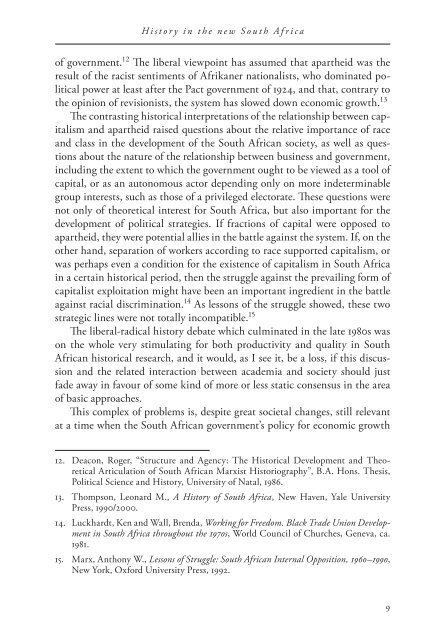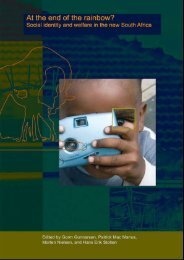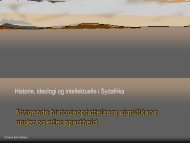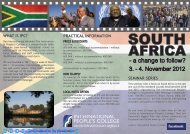History Making and Present Day Politics - Stolten's African Studies ...
History Making and Present Day Politics - Stolten's African Studies ...
History Making and Present Day Politics - Stolten's African Studies ...
Create successful ePaper yourself
Turn your PDF publications into a flip-book with our unique Google optimized e-Paper software.
H i s t o r y i n t h e n e w S o u t h A f r i c a<br />
of government. 12 The liberal viewpoint has assumed that apartheid was the<br />
result of the racist sentiments of Afrikaner nationalists, who dominated political<br />
power at least after the Pact government of 1924, <strong>and</strong> that, contrary to<br />
the opinion of revisionists, the system has slowed down economic growth. 13<br />
The contrasting historical interpretations of the relationship between capitalism<br />
<strong>and</strong> apartheid raised questions about the relative importance of race<br />
<strong>and</strong> class in the development of the South <strong>African</strong> society, as well as questions<br />
about the nature of the relationship between business <strong>and</strong> government,<br />
including the extent to which the government ought to be viewed as a tool of<br />
capital, or as an autonomous actor depending only on more indeterminable<br />
group interests, such as those of a privileged electorate. These questions were<br />
not only of theoretical interest for South Africa, but also important for the<br />
development of political strategies. If fractions of capital were opposed to<br />
apartheid, they were potential allies in the battle against the system. If, on the<br />
other h<strong>and</strong>, separation of workers according to race supported capitalism, or<br />
was perhaps even a condition for the existence of capitalism in South Africa<br />
in a certain historical period, then the struggle against the prevailing form of<br />
capitalist exploitation might have been an important ingredient in the battle<br />
against racial discrimination. 14 As lessons of the struggle showed, these two<br />
strategic lines were not totally incompatible. 15<br />
The liberal-radical history debate which culminated in the late 1980s was<br />
on the whole very stimulating for both productivity <strong>and</strong> quality in South<br />
<strong>African</strong> historical research, <strong>and</strong> it would, as I see it, be a loss, if this discussion<br />
<strong>and</strong> the related interaction between academia <strong>and</strong> society should just<br />
fade away in favour of some kind of more or less static consensus in the area<br />
of basic approaches.<br />
This complex of problems is, despite great societal changes, still relevant<br />
at a time when the South <strong>African</strong> government’s policy for economic growth<br />
12. Deacon, Roger, “Structure <strong>and</strong> Agency: The Historical Development <strong>and</strong> Theoretical<br />
Articulation of South <strong>African</strong> Marxist Historiography”, B.A. Hons. Thesis,<br />
Political Science <strong>and</strong> <strong>History</strong>, University of Natal, 1986.<br />
13. Thompson, Leonard M., A <strong>History</strong> of South Africa, New Haven, Yale University<br />
Press, 1990/2000.<br />
14. Luckhardt, Ken <strong>and</strong> Wall, Brenda, Working for Freedom. Black Trade Union Development<br />
in South Africa throughout the 1970s, World Council of Churches, Geneva, ca.<br />
1981.<br />
15. Marx, Anthony W., Lessons of Struggle: South <strong>African</strong> Internal Opposition, 1960–1990,<br />
New York, Oxford University Press, 1992.









